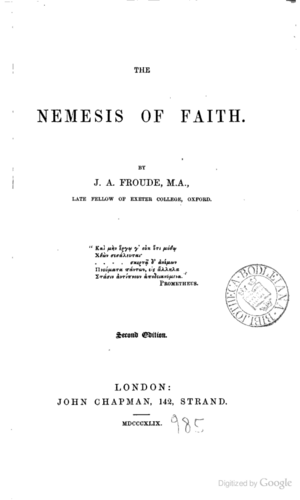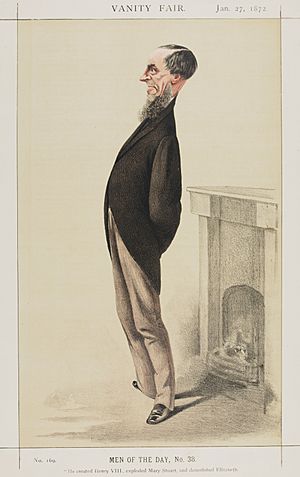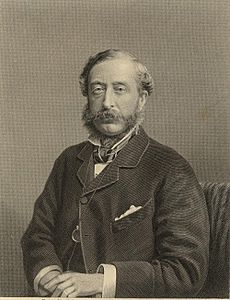James Anthony Froude facts for kids
Quick facts for kids
James Anthony Froude
FRSE
|
|
|---|---|
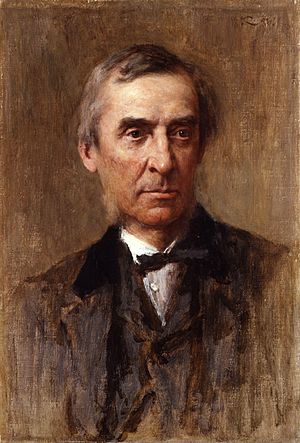 |
|
| Born | 23 April 1818 Dartington Rectory, Devon, England
|
| Died | 20 October 1894 (aged 76) Woodcot, Kingsbridge, Devon, England
|
| Resting place | Shadycombe Cemetery, Salcombe, Devon |
| Alma mater | Oriel College, Oxford |
| Occupation | Historian |
| Title | Regius Professor of Modern History |
| Term | 1892–1894 |
| Predecessor | Edward Augustus Freeman |
| Successor | Frederick York Powell |
| Relatives | William Froude and Hurrell Froude (brothers) |
James Anthony Froude (frood; born April 23, 1818 – died October 20, 1894) was an English historian, writer, and editor. He grew up wanting to be a clergyman, but he started to doubt some church teachings. These doubts appeared in his 1849 novel, The Nemesis of Faith, which caused a stir. Because of this, he decided not to become a clergyman.
Froude then became a historian. He was famous for his book, History of England from the Fall of Wolsey to the Defeat of the Spanish Armada. He was inspired by Thomas Carlyle. Froude's history books often shared strong opinions, which led to many disagreements. He also caused controversy after his death by publishing personal writings of Thomas and Jane Welsh Carlyle. These writings showed Carlyle's difficult personality and led to discussions about their marriage.
Life and Work of James Froude
Early Life and School (1818–1842)
James Anthony Froude was born in Dartington, Devon, England. His father was Robert Hurrell Froude, a church leader. James was the youngest of eight children. His brothers included William Froude, an engineer, and Richard Hurrell Froude, a religious writer.
Sadly, by the time James was three, his mother and five siblings had died. This left him with a strict father and brother. He went to Westminster School from age 11 to 15. He found school difficult and was often bullied. Despite this, he loved reading history and religious books.
In 1836, he went to Oriel College, Oxford. This college was a center for a religious movement called the Oxford Movement. Froude started to do better in his studies here. He earned a good degree in 1840. After college, he worked as a private tutor in Ireland. He returned to Oxford in 1842. He won an essay prize and became a fellow at Exeter College.
Religious Doubts and New Paths (1842–1849)
Froude's brother, Richard Hurrell, was a leader in the Oxford Movement. This group wanted the Anglican Church to be more like the Catholic Church. James grew up hearing these ideas from his brother and friends like John Henry Newman.
However, Froude began to disagree with the Movement. His time in Ireland showed him a different side of Protestantism. He also saw poverty among Catholics, which bothered him. He started reading writers like Spinoza and Thomas Carlyle. These writers had different religious views.
Even with his doubts, Froude still respected Newman. He even helped Newman with a book about English saints. But Froude found it hard to believe the stories of saints. He thought they were more like myths than real history. This made his religious faith even weaker.
In 1845, Froude became a deacon (a type of church official). He hoped to change the church from the inside. But he soon realized he couldn't agree with the church's teachings. He still believed in God, but not in all the church's rules.
He shared his doubts in his books. First, Shadows of the Clouds (1847), and then The Nemesis of Faith (1849). The Nemesis of Faith caused a big scandal. It was even publicly burned at Oxford. Froude had to leave his job at the college. He found help from his friend Charles Kingsley. Many people, like George Eliot, felt sympathy for him.
Writing English History (1850–1870)
In 1850, Froude married Charlotte Grenfell. She was the sister-in-law of his friend Charles Kingsley. They moved to North Wales. Froude was happy there and supported by friends. He couldn't work in politics because of his past as a deacon. So, he decided to become a writer.
He started by writing reviews and essays for magazines. Froude soon moved back to England to research his big book. This book was called History of England from the Fall of Wolsey to the Defeat of the Spanish Armada. He spent 20 years working on it. He looked at many old documents and records.
Froude wrote history in a dramatic way, like Thomas Carlyle. He wanted to defend the English Reformation. He believed it was a key event that saved England. He focused on figures like Henry VIII and Elizabeth I. He also showed his dislike for the Catholic Church.
When his first history books came out in 1856, they caused debate. Some people didn't like how he showed Henry VIII. Others disagreed with his views on the Church. But the books were very popular. After Thomas Macaulay died in 1859, Froude became the most famous historian in England.
In 1862, he became a member of the American Philosophical Society. A historian named Edward Augustus Freeman often criticized Froude's work. But Froude usually defended his research well.
In 1860, Froude's first wife, Charlotte, died. In 1861, he married Henrietta Warre. Also in 1861, Froude became the editor of Fraser's Magazine. He was editor for 14 years. In 1869, Froude was chosen as Lord Rector of St. Andrews. In 1870, a new law allowed deacons to leave their religious roles. Froude was finally able to officially become a regular citizen again.
Travels and Controversies (1870–1880)
After finishing his History of England, Froude started researching a history of Ireland. This book, English in Ireland in the Eighteenth Century, also shared strong opinions. He favored Protestantism and tried to justify British rule in Ireland. He argued that Ireland needed more control from London.
In 1872, Froude went to the United States to give lectures. Many Americans, especially Irish Americans, were against British rule in Ireland. Froude hoped to change their minds. His lectures caused a lot of debate. He had to cut his trip short and returned to England disappointed.
Froude's Irish history also had critics in England. In 1874, his second wife, Henrietta, died. Froude then moved to Wales. To distract himself, Froude traveled to Southern Africa. He went there to report on how to unite the colonies and states in the region. This area was important for the British Empire. Uniting the states under British rule was seen as a way to gain more control.
On his second trip to Southern Africa in 1875, Froude was an official representative. He was meant to promote the idea of a confederation. But he often shared his own political views. In the Cape Colony, he spoke publicly about using forced labour for the local Xhosa people. This was very controversial. The Cape government at the time wanted to treat Xhosa citizens fairly.
Froude also disliked the local politics in the Cape. The idea of confederation was not popular in Southern Africa. The Cape Colony was the largest state. Froude met with its Prime Minister, John Molteno. Molteno told Froude that the confederation idea was too early. He said his government would not support it. He also worried that uniting with less liberal states would harm the rights of black citizens in the Cape.
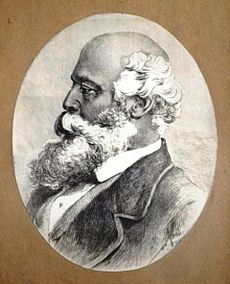
Froude then openly sided with an opposition group. He promised a special honor to their leader if they would overthrow the Cape's elected government. He even suggested creating a separate white area and taking land from the Xhosa and Basotho people. Molteno was very angry. He accused Froude of interfering in the Cape Colony's democracy.
Froude's mission was not successful. It caused a lot of trouble in Southern Africa. His observations about Africa were later included in his essay collection Short Studies on Great Subjects.
Later Life and Legacy (1885–1894)
After his travels, Froude wrote two books about the British colonies. These were Oceana, or, England and Her Colonies (1886) and The English in the West Indies, or The Bow of Ulysses (1888). These books shared Froude's thoughts on the British Empire. He wanted to inspire enthusiasm for the idea of colonies.
However, these books caused much debate. An intellectual from Trinidad, John Jacob Thomas, wrote a book called Froudacity to criticize Froude's views on the West Indies.
Froude also wrote a historical novel, The Two Chiefs of Dunboy. In 1892, Froude was appointed to teach history at Oxford University. This was a controversial choice because his critics had held that same position. But his lectures were very popular. He taught about the English Reformation and famous English sailors.
The demanding schedule was too much for Froude as he got older. In 1894, he retired to Kingsbridge, Devonshire. He died on October 20, 1894, and is buried in Salcombe Cemetery.
Family Life
James Froude was married twice. First, in 1849, to Charlotte Maria Grenfell. She died in 1860. Then, in 1861, he married Henrietta Elizabeth Wade. She died in 1874.
He had one daughter, Margaret, with his first wife. With his second wife, he had a son, Ashley Anthony Froude, and another daughter, May. Ashley Anthony Froude was born in 1863. He later became a Justice of the Peace. His son, John Aubrey Froude, died in 1914 when his ship was torpedoed.
Works by James Froude
Fiction Books
- Shadows of the Clouds (1847)
- The Nemesis of Faith (1849)
- The Two Chiefs of Dunboy (1889)
Non-Fiction Books
- History of England from the Fall of Wolsey to the Death of Elizabeth (1856–1870)
- Short Studies on Great Subjects (1867–1882)
- The English in Ireland in the Eighteenth Century (1873)
- Caesar: A Sketch (1879) (a biography of Julius Caesar)
- Bunyan (1880) (a biography of John Bunyan)
- Thomas Carlyle (1882)
- Luther: A Short Biography (1884) (a biography of Martin Luther)
- Historical Essays (1886)
- Oceana, or, England and Her Colonies (1886)
- The English in the West Indies or The Bow of Ulysses (1888)
- Lord Beaconsfield (1890) (a biography of Benjamin Disraeli)
- The Divorce of Catherine of Aragon (1891)
- Life and Letters of Erasmus (1894)
- English Sea-Men in the Sixteenth Century (1895)
- My Relations with Carlyle (1903)
Translations
- Johann Wolfgang von Goethe – Elective Affinities (1854)
Images for kids
-
Prime Minister of the Cape, Sir John Molteno
 | Victor J. Glover |
 | Yvonne Cagle |
 | Jeanette Epps |
 | Bernard A. Harris Jr. |


